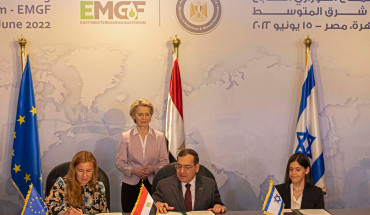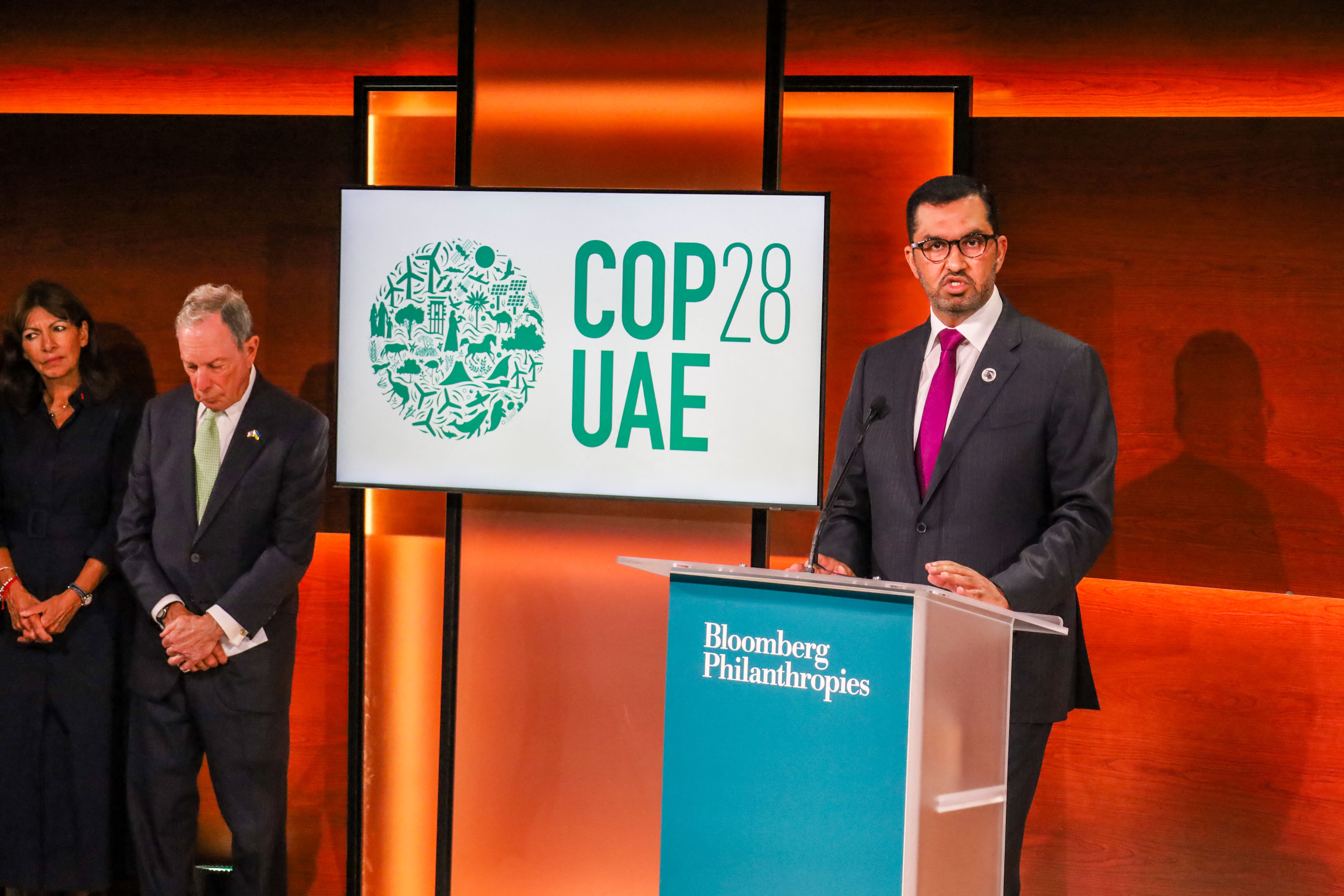The COP28 U.N. Climate Conference, to be hosted by the UAE, will commence at the end of a consequential year in terms of climate change and climate action. Summer 2023 was the hottest ever documented. And an unprecedented month of extreme and high temperatures in July saw the global average temperature record broken three times in a span of four days. Alongside this year’s extreme heat, various parts of the globe saw the outbreak of increasingly devastating wildfires and flooding events. With COP28 coming on the heels of a string of calamitous weather incidents, those dire demonstrable consequences of a warming Earth further elevate the significance of a meeting that was already expected to address important topics with respect to the global climate agenda. The culmination of the global stocktake process that started after COP26 will spotlight the gap between climate change effects and climate mitigation efforts, which is already expected to be wider than it has been previously.
Please join the Middle East Institute’s Climate and Water Program for a virtual event discussing the critical issues that will come to a head at COP28 as world leaders come together in Dubai to address the current and projected consequences of a rapidly warming climate.
Speakers
Aisha Al-Sarihi
Research Fellow, Middle East Institute, National University of Singapore
Essam Heggy
Chief Scientist and Research Director of the Earth Science Program, Qatar Environment and Energy Research Institute
Laurent A. Lambert
Public Policy Assistant Professor, Doha Institute for Graduate Studies
Mohammed Mahmoud, moderator
Senior Fellow and Director of Climate and Water Program, Middle East Institute
Five Keytakeaways
- Ongoing Unprecedented Climate Extremes: Currently, there is evidence of unprecedented climate extremes. Global average temperatures broke records three times within a four-day span in July, emphasizing the tangible impacts of extreme daily highs beyond the summer months.
- Continued Emphasis on Climate Change Impacts: Essam Heggy explained that climate change is not solely about average temperature increases. A one-degree rise signifies systemic changes, including disruptions in ecosystems, heightened wildfire risks, and challenges to existing infrastructure.
- Global Stocktake and Ongoing Mitigation Efforts: The ongoing significance of COP28 lies in the global stocktake process initiated after COP26. There is a current gap between climate change effects and global mitigation efforts. Specific points include the need to reduce greenhouse gas emissions by 43% by 2030, highlighting the urgency for robust mitigation strategies.
- Current Momentum in the Middle East's Energy Transition: Aisha Al-Sarihi discussed the increasing momentum for energy transition in the MENA region, pointing out that there is a notable shift towards renewable energy technologies in the Middle East. The region has seen a significant increase in the installed capacity of renewable energy, reaching up to 4,000 GW. Various sectors, including the private sector and civil society, actively participate in climate-related initiatives.
- Ongoing Focus on Water Security and Climate Adaptation: Water security remains a critical concern, particularly regarding the Middle East's stressed water resources. There is an ongoing need to elevate the importance of water-related issues in climate discussions. Specific ongoing initiatives include the exploration of innovative solutions for sustainable water production and recognizing the connection between water and energy in the face of climate challenges.
Detailed Speaker Biographies
Aisha Al-Sarihi’s areas of research expertise and interest include clean energy policy and climate economics, policies, and governance, with a focus on the Arab region. Following her PhD, from 2016 to 2017, she was a research officer at the London School of Economics and Political Science’s Middle East Centre. She was also a former visiting scholar at the Arab Gulf States Institute in Washington (2017) and Georgetown University’s Center for Contemporary Arab Studies (2018). Before joining MEI, Dr. Al-Sarihi was a research associate in the Climate and Environment Program at King Abdullah Petroleum Studies and Research Center (KAPSARC) from 2019 to 2021.
Essam Heggy is the Chief Scientist and Research Director of the Earth Science Program at the Qatar Environment and Energy Research Institute (QEERI), under Hamad Bin Khalifa University (HBKU). His research interests in space and planetary geophysics aim to understand subsurface water and ice occurrence and distributions in Earth’s arid regions, Mars, the Moon, Jovian icy moons, and near-Earth objects using radar techniques. Heggy is also a research scientist at the Viterbi School of Engineering in the University of Southern California, and affiliate of the Radar Science and Engineering section NASA Jet Propulsion Laboratory. He is also a tenured Associate Professor at the Institut de Physique du Globe de Paris in France, a member of the French National Council of Astronomy & Physics (CNAP), and served in several advisory roles for international agencies supporting educational and scientific reforms in the MENA area. Heggy is also a contributing scientist to several NASA & ESA proposed planetary and terrestrial radar imaging and soundings experiments including the RIME radar on the JUICE mission to Jupiter and Envision radar for Venus. He works on a wide range of space exploration projects, including with the Mars Express orbiter, the Chandrayaan-1, and the Lunar Reconnaissance Orbiter.
Laurent A. Lambert is a faculty at the School of Economics, Administration and Public Policy of the Doha Institute for Graduate Studies, in Qatar, and Sciences Po Paris, in France. He previously was senior policy analyst at the Social and Economic Survey Research Institute (SESRI) and senior administrator of the Qatar Humanitarian Innovation Lab initiative, both at Qatar University. Laurent has been working as a sustainable development researcher, project/program manager, consultant, and government adviser in the fields of international risks, public policy and conflicts with several governments and international organizations over the past 15+ years. He is a former Advisory Board member of the United Nations Climate Convention’s center in charge of green technology transfer (the CTCN), a former representative of the research community at the United Nations climate negotiations (UNFCCC), and an expert reviewer of the science-policy interface for the latest synthesis report of the Inter-Governmental Panel on Climate Change (IPCC). Laurent holds bachelor’s and master’s degrees (Summa Cum Laude) in Development Geography from the Université de Paris 1 Sorbonne, and a PhD. from the Oxford University School of Geography and the Environment.
Mohammed Mahmoud is the Director of the Climate and Water Program and a senior fellow at the Middle East Institute. His areas of expertise include climate change adaptation, water policy analysis and scenario planning. Mahmoud has held leadership positions in several organizations. Most recently as Chair of the Water Utility Climate Alliance; a coalition of 12 of the nation’s largest water utilities that collectively provide water to over 50 million people in the United States, with the purpose of providing leadership and collaboration on climate change issues that affect water agencies. Prior to that he was President of the North American Weather Modification Council. Mahmoud’s professional accomplishments include negotiating and formalizing a 10-year multi-state cloud seeding funding agreement between seven Colorado River Basin states, developing and implementing the first ever climate adaptation plan for a multi-county water district in Arizona, and helping secure a 1.1 million dollar grant from NASA for Arizona State University to study the impacts of climate change on the hydrology of the Western United States. Mohammed has also conducted water management research and work for the Middle East and North Africa region.
Photo by ZAK BENNETT/AFP via Getty Images













